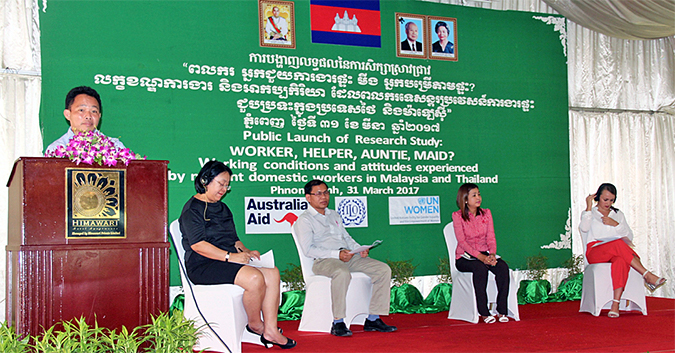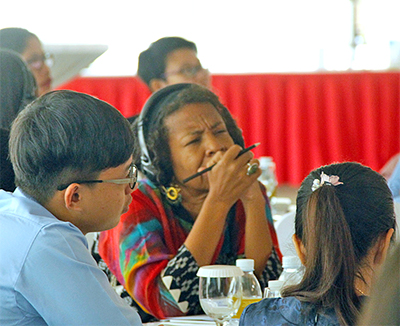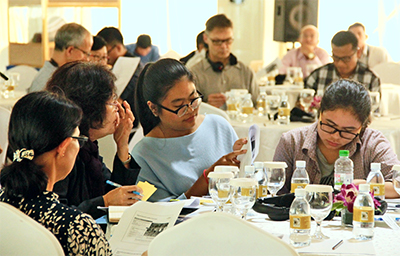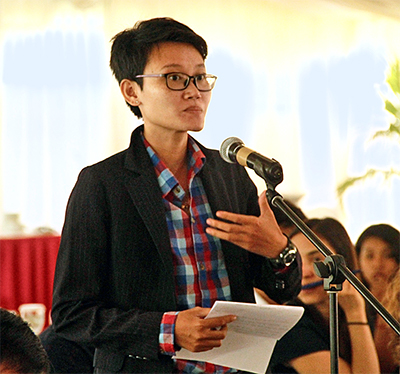UN Women Cambodia launches study on working conditions and attitudes experienced by domestic workers
Date:
Author: Sarah Lewis
Phnom Penh, Cambodia — Domestic work, a sector that predominantly employs women, is regularly excluded from national minimum wage protection, a recent joint UN Women and International Labour Organization (ILO) study finds. Many domestic workers earn far less than the minimum wage.

“No one is born literate. Everyone was born to earn knowledge during their life.” In a crowd-silencing anecdote of Kyek, a 28-year-old domestic worker from Myanmar, UN Women Representative in Cambodia, Janet Wong, kicked off the public launch of UN Women – ILO’s recent (2016) research study “Worker, Helper, Auntie, Maid?” on public perceptions and employment experiences of domestic workers in Malaysia and Thailand. And in Cambodia, employers commonly pay below the minimum wage in garment manufacturing industries that primarily employ women.
Domestic work is indispensable to the sustainability and reproduction of human lives. Across the globe, 53 million domestic workers do the groundwork in private homes, hotels, restaurants and the like, which enables others to go about their working day efficiently. Domestic workers care for our families and communities. They prop up entire economies. Yet, despite the high dependence of societies and economies on this type of labour, domestic work is typically undervalued as “low skilled” – and it is certainly not given the same respect as other paid work outside the home.
“Excluding domestic work from definitions of ‘proper work’,” Wong noted, “leads to domestic workers being denied the social protections and benefits afforded to other labour sectors. It makes domestic workers susceptible to infringements on their labour rights”. Indeed, without equal protection, employers hold the power to interpret what constitutes sufficient working hours, or whether they will permit sick leave, overtime pay rest periods, freedom of movement and even domestic workers’ right to a contract and freedom of movement.

Globally domestic workers are among the most vulnerable to human rights abuses. According to the latest ILO statistics, 1 in 5 are international migrants, who leave their families, homes and support networks in search of remunerative employment – many of whom are undocumented. Regional Programme Officer, Sukanya Thongthumrong showed that these vulnerabilities are intensified by negative attitudes towards’ migrant workers, whereby employers can be influenced by discriminatory stereotypes of migrants as “illegals” or “criminals” to justify limiting their migrant domestic worker employee’s autonomy.
Thongthumrong highlighted the critical role that gender plays in shaping the lives and working experiences of migrant domestic workers. Traditional stereotypes and regressive cultural prescriptions dictate that domestic work is “a women’s responsibility” and, therefore, not really “work”. This, in addition to the corresponding constriction of women’s economic opportunities compared with men, leads to women dominating the domestic work sector by 80 percent.

Focusing on the disproportionate gender composition of this vulnerable and often unprotected sector, Thongthumrong highlighted that the growth of the care economy globally would mean an increasing number of women moving into vulnerable employment.
The UN Women report showed stark discrepancy between policy and practice regarding the labour conditions and working experiences of migrant domestic workers. While the macro-level policy frameworks exists, the underlying social and cultural factors, prejudices and biases regarding domestic work, gender roles and migrants remain.
“Everyone – duty-bearers, civil society and the media – must work together to transform the negative cultural attitudes and discriminatory practices to create a shift in the way domestic work is perceived,” said the programme officer.
Debate and discussion from an incredibly diverse range of sectors and age groups were later facilitated by an event’s moderator Sophea Khun, National Governance Programme Manager at UN Women Cambodia.

Finally National Women’s Economic Empowerment Programme Manager at UN Women Cambodia, Socheath Heng brought the launch to a reflective close – calling upon all present to ask themselves: “Where would I be without the backbreaking work of domestic workers? What can I do to bring visibility to the challenges faced by these invisible women? And how can I – through meaningful actions – break down the prejudices and discrimination deny domestic workers the respect they and their work deserves?”
UN Women’s publication launch showed that – regardless of personal or professional background – that employing domestic workers is a social practice as much as it is an economic one. Within that, everyone has a role to play in creating environments where their rights are upheld and their work is valued.
The study was supported by the Australian Government Department of Foreign Affairs and Trade (DFAT).
For more information
Sarah LEWIS
Women's Economic Empowerment, Programme Intern
UN Women, Cambodia
E-mail: sarah.lewis@unwomen.org